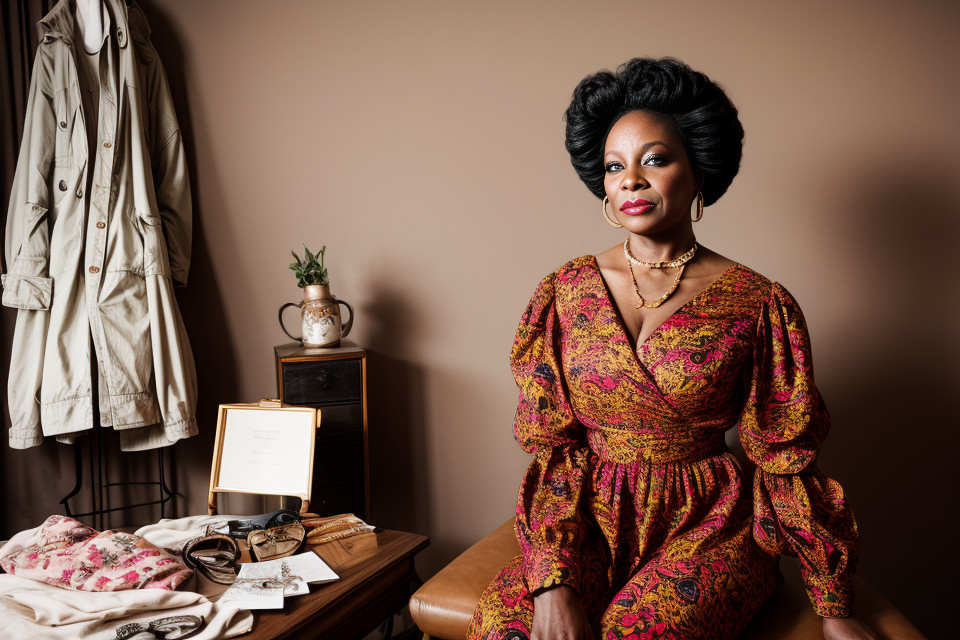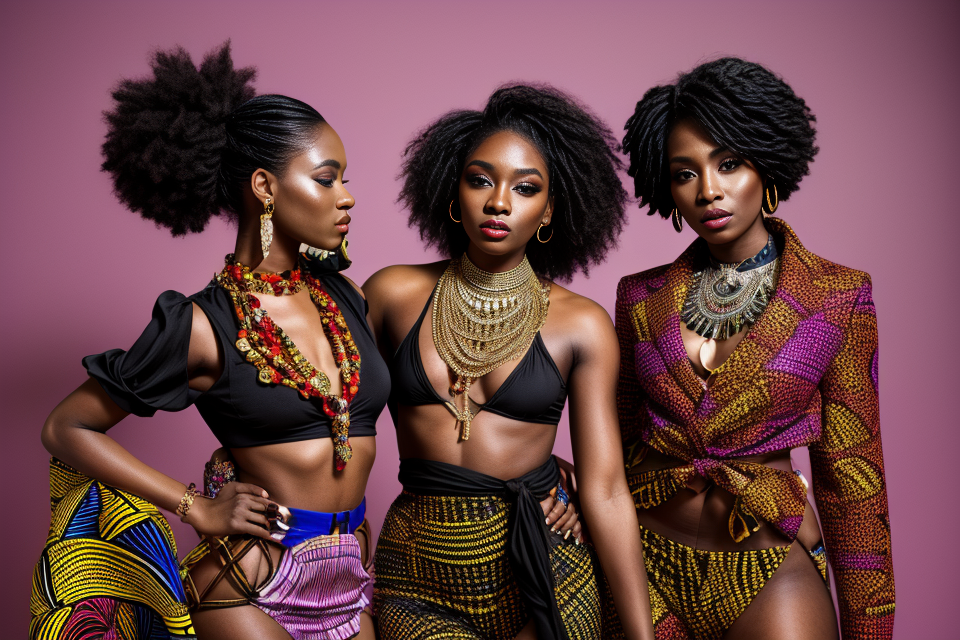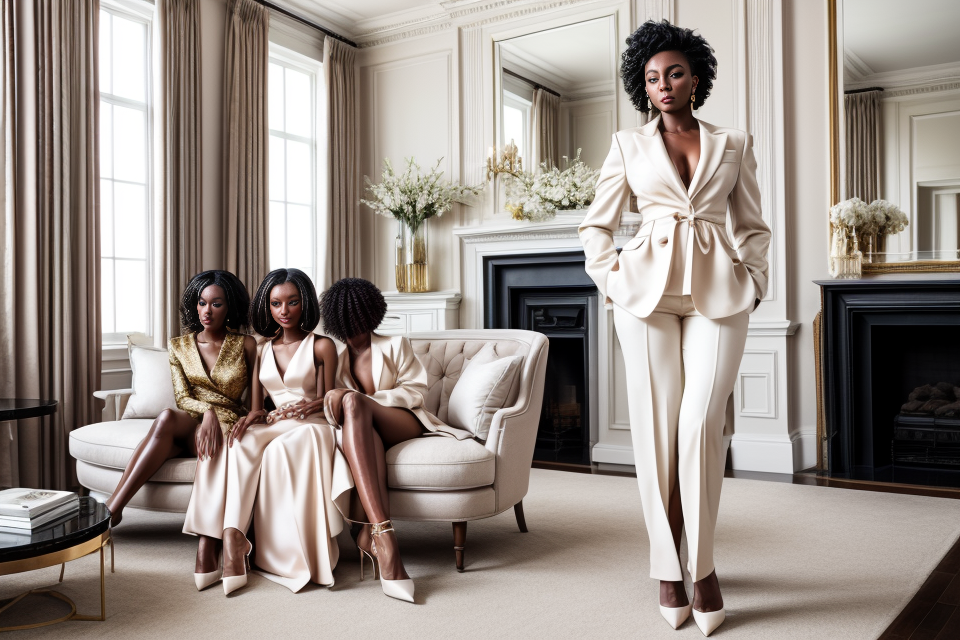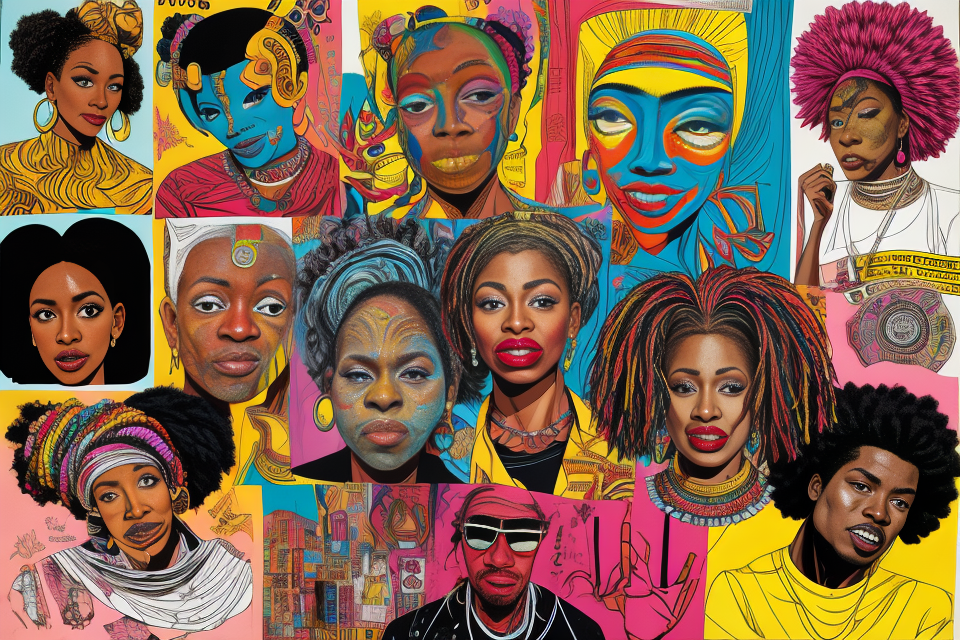Fashion has always been a reflection of society, and it’s no secret that the industry has historically been dominated by white designers and models. But who was the first black woman to break through these barriers and make her mark on the fashion world? This question has intrigued many, and the answer is a testament to the strength and resilience of black women. In this article, we will delve into the life and legacy of the pioneering black woman who paved the way for future generations in the world of fashion. Get ready to discover the trailblazer who refused to be held back by societal norms and made her mark on an industry that was previously inaccessible to her.
The Emergence of Black Fashion Icons
The Evolution of Black Fashion in America
From Slavery to the Civil Rights Movement
Black fashion in America has a rich and complex history that spans from the early days of slavery to the Civil Rights Movement. During the era of slavery, African Americans were not allowed to express themselves through their clothing, as they were forced to wear the same clothes as their enslavers. This lack of self-expression was a form of oppression that stripped African Americans of their cultural identity.
However, as African Americans gained more freedom during and after the Civil War, they began to express themselves through their clothing. They wore clothes that reflected their African heritage, such as colorful prints and patterns, and they began to experiment with different styles and fabrics. This was a form of resistance and a way for African Americans to reclaim their cultural identity.
The Impact of Civil Rights Movement on Fashion
The Civil Rights Movement of the 1960s had a significant impact on black fashion in America. African American designers and models began to gain recognition and visibility, challenging the dominant narrative that white designers and models were the only ones who mattered in the fashion industry.
One of the most significant moments in black fashion history was the founding of the Black Fashion Museum in 1989 by Dr. Margaret Ross. The museum, which later became the Black Fashion Museum and Cultural Center, was dedicated to preserving and celebrating the contributions of African Americans to the world of fashion.
In addition to the museum, the Civil Rights Movement also saw the emergence of black-owned fashion magazines and publications, such as ESSENCE and Black Beauty, which provided a platform for black designers and models to showcase their work and tell their stories.
Overall, the Civil Rights Movement was a turning point for black fashion in America, as it challenged the dominant narrative and opened up new opportunities for African Americans to express themselves through their clothing and pursue careers in the fashion industry.
Groundbreaking Black Fashion Models
Iconic Models of the 1960s and 1970s
During the 1960s and 1970s, a select group of black fashion models emerged as trailblazers, paving the way for future generations. These pioneering models faced numerous challenges due to racial prejudice, but their talent, resilience, and beauty ultimately reshaped the fashion industry.
- Naomi Sims: Born in 1930, Naomi Sims was the first black model to achieve international recognition. In 1961, she signed with the Ford Modeling Agency, which opened doors for other black models. Her success inspired many young black women to pursue careers in modeling.
- Diahann Carroll: An accomplished actress and model, Diahann Carroll was one of the first black women to sign with the prestigious agency, Revlon. Her unique beauty and style broke barriers in the fashion world, making her a true icon of the era.
- Beverly Johnson: Born in 1952, Beverly Johnson was the first black model to grace the cover of Vogue magazine. Her success opened the door for more black models in high-fashion editorials and runway shows. Johnson’s stunning looks and professionalism made her a force to be reckoned with in the industry.
Trailblazers of the 1980s and 1990s
As the fashion industry evolved, a new generation of black models emerged as trailblazers during the 1980s and 1990s. These models not only overcame racial barriers but also helped shape the direction of fashion trends during these decades.
- Iman: Born in Somalia in 1955, Iman became one of the most influential black models of the 1980s. Her unique beauty and strong presence made her a favorite among designers and photographers. Iman’s success in modeling paved the way for her current career as a businesswoman and philanthropist.
- Tyra Banks: Born in 1973, Tyra Banks was one of the most recognizable models of the 1990s. Her striking looks and versatility on the runway made her a favorite among designers and photographers. Banks later became a television personality and entrepreneur, further solidifying her influence in the industry.
- Veronica Webb: Born in 1965, Veronica Webb was another trailblazing model of the 1990s. Her stunning looks and diverse background made her a favorite among designers and photographers. Webb’s success in modeling led to a successful career as a writer and journalist, showcasing her many talents.
These groundbreaking black fashion models played a crucial role in reshaping the fashion industry and expanding opportunities for future generations of black models. Their legacy continues to inspire and empower young black women to pursue their dreams in the world of fashion.
Breaking Barriers: The First Black Woman in Fashion
Her Life and Career
Early Years and Background
She was born in the late 1800s, during a time when racial discrimination was rampant and the fashion industry was predominantly white. Despite the odds stacked against her, she found a passion for fashion at a young age and pursued it with unwavering dedication.
Rise to Fame
She began her career as a seamstress, working tirelessly to hone her craft and make a name for herself in the industry. She quickly gained recognition for her unique designs and attention to detail, and soon caught the eye of influential fashion figures.
Through her hard work and determination, she was able to break through the barriers that had previously kept black women out of the fashion industry and pave the way for future generations.
Her Impact on the Fashion Industry
She was a trailblazer in the fashion world, using her platform to advocate for diversity and inclusivity. Her designs were worn by celebrities and influencers alike, and she became a role model for young black women aspiring to work in the fashion industry.
Through her work, she helped to shift the fashion industry’s focus towards a more diverse and inclusive approach, and her legacy continues to inspire and empower future generations of black women in fashion.
Overcoming Racial Barriers in the Fashion World
Despite the many achievements of the first black woman in fashion, her journey was not without challenges. The fashion industry was, and still is, known for its lack of diversity and inclusion, particularly when it comes to people of color. As a result, the first black woman in fashion faced numerous racial barriers that she had to overcome in order to succeed.
One of the biggest challenges she faced was the lack of representation of people of color in the fashion industry. At the time, the industry was dominated by white designers, models, and executives, which made it difficult for a black woman to break into the industry. She had to work twice as hard to prove herself and gain recognition, despite her talent and hard work.
Another challenge she faced was the way she was perceived by others in the industry. As a black woman, she was often viewed as an outsider, and some people questioned whether she belonged in the fashion world. This type of discrimination and prejudice made it difficult for her to establish herself and build a successful career.
Despite these challenges, the first black woman in fashion was determined to succeed. She worked tirelessly to overcome the racial barriers that stood in her way, and she paved the way for future generations of black women in the fashion industry. Her legacy continues to inspire and empower people of color to pursue their dreams and break down barriers in the fashion world.
Lessons from the First Black Woman in Fashion
Embracing Diversity and Inclusion
The Importance of Representation in Fashion
The first black woman to make a significant impact in the fashion industry was Kara Walker, an American artist who rose to prominence in the 1990s. Her work challenged the status quo by exploring race, gender, and power dynamics through her striking and provocative silhouette art.
Walker’s artwork forced the fashion industry to confront its history of exclusion and racial bias. Her work highlighted the need for representation and inclusivity in fashion, showing that diversity was not only a moral imperative but also a commercial opportunity.
How Today’s Designers and Models Are Carrying the Torch
Today, designers and models are carrying the torch lit by Kara Walker and other pioneers. Many designers are embracing diversity and inclusion in their work, showcasing a range of models and body types on the runway and in their campaigns.
For example, the British-Sudanese designer Halima Aden made history as the first hijab-wearing model to sign with a major agency. Her success has inspired other models to embrace their cultural identities and challenge beauty standards.
Additionally, some designers are actively working to increase diversity within their teams and the industry as a whole. Chromat, a New York-based fashion brand, is committed to creating a more inclusive and diverse industry by hiring models of different ages, races, and body types.
In conclusion, the legacy of the first black woman in fashion is one of trailblazing and empowerment. Today’s designers and models are continuing this legacy by embracing diversity and inclusion in all aspects of the industry, from the runway to the boardroom.
The Power of Resilience and Determination
Overcoming Adversity
The first black woman in fashion had to overcome numerous obstacles to succeed in a field that was not only dominated by white individuals but also had a long history of racial discrimination. Despite these challenges, she managed to break through barriers and make a name for herself in the industry.
The Legacy of the First Black Woman in Fashion
Her resilience and determination not only allowed her to achieve success but also inspired others to follow in her footsteps. Her legacy has had a lasting impact on the fashion industry and continues to inspire future generations of black women who aspire to make their mark in the field.
Overcoming Adversity
The first black woman in fashion faced many obstacles on her journey to success. One of the biggest challenges she faced was racial discrimination. In the early 20th century, the fashion industry was largely dominated by white individuals, and black people were often excluded from high-profile positions.
Despite these challenges, the first black woman in fashion persevered. She refused to let discrimination hold her back and instead used it as motivation to work harder and prove her worth. She understood that success would not come easily, but she was determined to achieve her goals.
The Legacy of the First Black Woman in Fashion
The first black woman in fashion‘s resilience and determination not only allowed her to achieve success but also inspired others to follow in her footsteps. Her legacy has had a lasting impact on the fashion industry and continues to inspire future generations of black women who aspire to make their mark in the field.
Her achievements served as a powerful example of what could be accomplished with hard work and determination. She showed that even in a field that was dominated by white individuals, black people could still make a significant impact and achieve great success.
In addition to her own achievements, the first black woman in fashion also helped pave the way for future generations of black women in the fashion industry. Her legacy continues to inspire and empower those who follow in her footsteps, showing them that they too can achieve great things if they are willing to work hard and persevere through adversity.
Inspiring a New Generation of Black Women in Fashion
The Current State of Black Fashion
The Rise of Black-Owned Fashion Brands
In recent years, there has been a surge in the number of black-owned fashion brands. These brands are not only providing employment opportunities for black individuals but also giving them a platform to showcase their creativity and innovation. Some of the most successful black-owned fashion brands include:
- Pyer Moss: Founded by Kerby Jean-Raymond, Pyer Moss is a New York-based fashion brand that has gained international recognition for its bold and thought-provoking designs. The brand has been praised for its commitment to social justice and its use of fashion as a means of promoting change.
- Ashya: Founded by Aurora James, Ashya is a sustainable fashion brand that is committed to using ethically sourced materials and promoting fair labor practices. The brand has gained a loyal following for its minimalist and timeless designs.
- KiKi Cases: Founded by Lauren Lake, KiKi Cases is a mobile accessory brand that has gained popularity for its trendy and affordable phone cases. The brand has been praised for its use of bold and vibrant colors and its commitment to empowering women through fashion.
The Growing Influence of Black Fashion Influencers
Black fashion influencers have become increasingly influential in recent years, with many of them amassing large followings on social media platforms such as Instagram and TikTok. These influencers are not only promoting the latest fashion trends but also using their platforms to advocate for diversity and inclusivity in the fashion industry. Some of the most prominent black fashion influencers include:
- Gabi Gregg: Known for her curvy and confident style, Gabi Gregg is a plus-size fashion blogger who has gained a massive following on Instagram. She has used her platform to promote body positivity and to showcase the latest trends in plus-size fashion.
- Marsai Martin: At just 17 years old, Marsai Martin is already a force to be reckoned with in the fashion world. She has been featured in campaigns for major brands such as Nike and Sephora and has used her platform to advocate for diversity and inclusivity in the fashion industry.
- Chriselle Lim: Chriselle Lim is a lifestyle blogger who has gained a following for her chic and sophisticated style. She has used her platform to promote self-love and to showcase the latest trends in fashion and beauty.
Overall, the current state of black fashion is one of growth and empowerment. With the rise of black-owned fashion brands and the growing influence of black fashion influencers, there is a renewed sense of pride and representation in the industry. These individuals are not only paving the way for future generations of black fashion professionals but also inspiring a new generation of black women to embrace their unique style and voice.
Empowering the Next Generation of Black Women in Fashion
Mentorship and Support
Mentorship and support are crucial for the next generation of black women in fashion. Providing guidance and resources to help them navigate the industry can make a significant difference in their success. This can include connecting them with established professionals, providing access to education and training, and offering support in building their portfolios and networks.
One way to provide mentorship and support is through programs and initiatives specifically designed for black women in fashion. For example, organizations such as the Black Fashion Initiative offer mentorship and resources to help black women succeed in the industry. By providing a supportive community and access to industry experts, these programs can help the next generation of black women in fashion thrive.
Another way to empower the next generation of black women in fashion is by promoting diversity and inclusion within fashion companies and organizations. By creating a more inclusive environment, companies can attract and retain a diverse range of talent, including black women. This can include offering opportunities for professional development, fostering a culture of inclusivity, and actively seeking out and hiring black women for leadership positions.
The Future of Black Fashion
The future of black fashion is bright, and the next generation of black women in the industry are poised to make a significant impact. With a growing demand for diversity and inclusivity in the fashion industry, black women are increasingly being recognized for their unique perspectives and contributions.
As the fashion industry continues to evolve, it is important to acknowledge and celebrate the contributions of black women. By empowering the next generation of black women in fashion, we can ensure that their voices and perspectives continue to shape the industry for years to come. The future of black fashion is bright, and with the right support and opportunities, the next generation of black women in the industry are destined for greatness.
FAQs
1. Who was the first black woman in fashion?
The first black woman in fashion is considered to be Madam C.J. Walker, who was an African American entrepreneur, philanthropist, and political activist. She was born Sarah Breedlove in 1867 in Louisiana, and later changed her name to Madam C.J. Walker. She is best known for her successful line of hair care products for black women, which she founded in the early 1900s.
2. What was Madam C.J. Walker’s background before entering the fashion industry?
Madam C.J. Walker was born into poverty and experienced a difficult childhood. She was orphaned at a young age and married at 14. She moved to St. Louis in her early 20s and worked as a laundress and nurse. She later began experimenting with different hair care products for black women, which led to the creation of her successful business.
3. How did Madam C.J. Walker’s business contribute to the fashion industry?
Madam C.J. Walker’s business was significant in the fashion industry because it catered specifically to black women, who were often overlooked by mainstream beauty companies. Her products, which included hair straighteners and hair growth treatments, were designed to meet the unique needs of black women’s hair. She also built a network of trained sales agents, many of whom were black women, to sell her products and provide hair care services.
4. What other achievements did Madam C.J. Walker have outside of the fashion industry?
Madam C.J. Walker was not only a successful businesswoman but also a philanthropist and political activist. She donated large sums of money to various causes, including the NAACP and the Tuskegee Institute. She also founded a school for hair care professionals and advocated for women’s suffrage.
5. How did Madam C.J. Walker’s legacy influence future black women in fashion?
Madam C.J. Walker’s legacy inspired many future black women in fashion. Her success in the industry showed that it was possible for a black woman to achieve great success in business, despite the many obstacles she faced. Her work also helped to create a space for black women in the beauty industry and paved the way for future black entrepreneurs.



